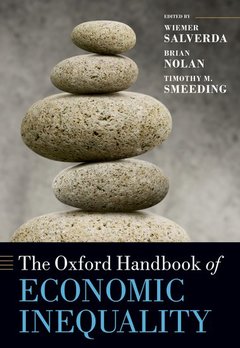The Oxford Handbook of Economic Inequality Oxford Handbooks Series
Langue : Anglais
Coordonnateurs : Salverda Wiemer, Nolan Brian, Smeeding Timothy M.

The Oxford Handbook of Economic Inequality presents a new and challenging analysis of economic inequality, focusing primarily on economic inequality in highly developed countries. Bringing together the world's top scholars this comprehensive and authoritative volume contains an impressive array of original research on topics ranging from gender to happiness, from poverty to top incomes, and from employers to the welfare state. The authors give their view on the state-of-the-art of scientific research in their fields of expertise and add their own stimulating visions on future research. Ideal as an overview of the latest, cutting-edge research on economic inequality, this is a must have reference for students and researchers alike.
Part 1 Inequality: Overview, Concepts and Measurement. 1. Introduction: The scope and worries of economic inequality. 2. Concepts and theories of inequality. 3. The measurement of economic inequality. Part 2 The Extent of Inequality. 4. Income inequality. 5. Functional and personal distribution. 6. Wealth and economic inequality. 7. High incomes and inequality. Part 3 Earnings inequality. 8. Inequality and earnings distribution. 9. Inequality and the labour market: employers. 10. Inequality and the labour market: unions. 11. Low pay. 12. Gender and economic inequality. Part 4 Dimensions of inequality. 13. Inequality, poverty and exclusion. 14. Inequality, consumption and time use. 15. Inequality and happiness. 16. Health and economic inequalities. 17. Inequality and education. Part 5 The Dynamics of Inequality. 18. Demographic transformation and economic inequality. 19. Migration, ethnicity and economic inequality. 20. Intergenerational economic inequality. 21. Intragenerational inequality and intertemporal mobility. Part 6 Global perspectives on inequality. 22. Inequality, growth and sectoral change. 23. Trade, skills and globalization. 24. Poverty and Inequality: The Global Context. Part 7 Can inequalities be changed?. 25. Economic inequality and the welfare state. 26. Inequality and policy making. 27. Prospects for achieving equality in market economies.
Wiemer Salverda initiated the LoWER network in 1995 to bring together Europe's leading scholars on low pay and earnings inequality. With the help of the European Community's research funding, the network has been a prolific organizer of meetings and a fertile producer of publications. Moving from the University of Groningen's Economics Faculty he joined the Amsterdam Institute for Advanced Labour Studies of the University of Amsterdam in 2000, where he helped build an extensive portfolio of international research and research cooperation. He provides expert advice on low pay, wage inequality, the minimum wage, youth labour, older workers, employment policy, and labour market reform to the EU, OECD, ILO and the British Low Pay Commission. He chairs the Supervisory Board of the international WageIndicator which offers internet surveying of pay in many countries. Brian Nolan is Professor of Public Policy in the School of Applied Social Science, UCD, Dublin. His research focuses on poverty, income inequality, the economics of social policy, and health economics, and recent publications include studies on social inclusion in the EU, equity in health service use, long-term trends in top incomes, child poverty, deprivation and multiple disadvantage, tax/welfare reform, and the minimum wage. Timothy M. Smeeding is Distinguished Professor of Economics and Public Administration at the Maxwell School of Syracuse University where he is also the founding director of the Center for Policy Research. He the Founder and Director Emeritus of the Luxembourg Income Study Project , which he began in 1983. His primary research focuses on national and cross-national comparisons of income and wealth inequality, social mobility, and poverty among vulnerable groups, including low-wage workers, children, the aged, and the disabled. He is spending the 2007-2008 academic year as a Visiting Fellow in residence at the Russell Sage Foundation in New York where he is examining cross-national pater
The Oxford Handbook of Economic Inequality assembles a star-studded cast and, with an Editors' Introduction, 26 distinct chapters, and over 700 pages of text, it delivers a massive compilation. The objective is to provide "an overview and evaluation of the current state of international research on economic inequality" and "to add new insights and open up novel perspectives for further research." And it succeeds.
Date de parution : 02-2011
Ouvrage de 768 p.
17.6x24.7 cm
Date de parution : 02-2009
Ouvrage de 760 p.
17.8x25.3 cm
Thèmes de The Oxford Handbook of Economic Inequality :
© 2024 LAVOISIER S.A.S.



